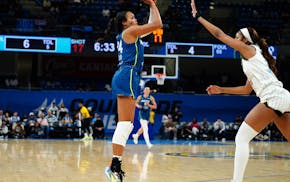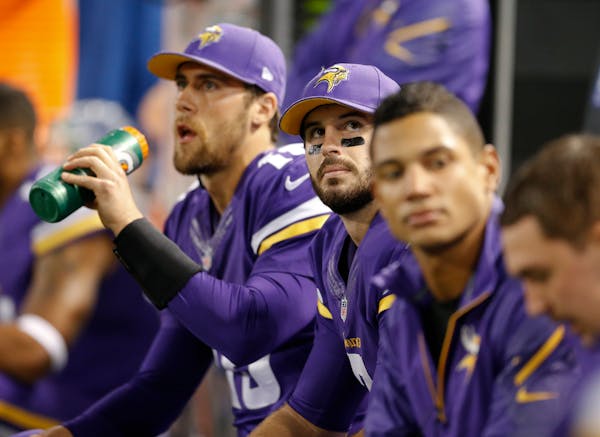Adrian Peterson emerged into the late July sunshine in Mankato and the crowd erupted with applause — just as if the past 10 months had never happened.
Not only is Peterson back in a Vikings uniform after his suspension for whipping his child, but the NFL is back and seemingly as popular as ever after an offseason of Deflategate, concussion controversy, Roger Goodell bashing, and more domestic violence accusations and player suspensions.
Before training camps began, ESPN already was taking the NFL's latest black eyes in stride, ranking the "most impactful player suspensions" for the upcoming season. Dallas Cowboys defensive end Greg Hardy ranked near the top after being accused of brutally assaulting his former girlfriend and threatening to kill her.
The popularity of the NFL's best-known players meanwhile continues to reach new heights. Even before he won another most valuable player award last year, a Wisconsin poll said Green Bay Packers quarterback Aaron Rodgers had a more favorable rating than George Washington, Martin Luther King Jr. and Mother Teresa.
"It's just a machine that just keeps getting bigger," Bo Brownstein said of the NFL. Brownstein, a former Northwestern University football player, hosted his first Fantasy Sports Combine in Las Vegas during the summer, charging fans $895 each to discuss fantasy football strategy with former players and coaches such as Daunte Culpepper and Mike Shanahan. Six-hundred people took part.
Back in Minnesota, Buffalo Wild Wings announced it was getting ready even more fantasy football kits — the Minneapolis-based company gave out more than 50,000 a year ago in a promotion to get fans to watch football at its restaurants. Bob Ruhland, the company's vice president for North American marketing, said meanwhile that the company had "recommended" that some of its restaurants simply "steer clear" of displaying jerseys and photos of Peterson because of his legal troubles. But he added: "I don't want you to get the idea [that] we have mandated" anything.
For the NFL, its fans and most of its corporate sponsors, it remains full speed ahead. The Packers, in one sign of the NFL's ever-increasing bottom line, announced in July that their 2015 revenue had topped $375 million, a 16 percent jump.
"Even with all of the negative revelations, it remains way ahead of every other professional sport in terms of popularity — a 'Teflon' sport if there ever was one," said Mark Kanazawa, a professor of economics at Carleton College in Northfield. "Few corporate sponsors have backed out, because football remains so popular that their bottom line is unaffected. [But] if that changes, so will they."
Some fallout
There have been some corporate casualties.
When the Radisson logo could be visibly seen as the Vikings held news conferences last September regarding Peterson's problems, the company abruptly suspended its corporate sponsorship with the team. The hotel chain, owned by Minnesota-based Carlson Cos., has not come back as a sponsor and a spokesman recently did little to explain what happened.
"Nothing fundamentally changed. [The sponsorship] expired, and we didn't renew it," Radisson spokeswoman Molly Biwer said. "It was," to her knowledge, she said, "just never discussed." Biwer however said that Carlson Cos. would have "a suite at the new [Vikings] stadium, and things like that." At the time Radisson suspended its sponsorship during the furor involving Peterson, the company said it was doing so because of its "long-standing commitment to the protection of children."
Others too have reassessed their feelings toward football.
"There used to be a time when you thought that football was a decent sport," said Peggy Briarty of Brooklyn Park, who said she went to Vikings games more than 30 years ago at Metropolitan Stadium in Bloomington. "But now it's gotten so slimy — and they don't care."
Deb Pyka, a mother from Wisconsin, wrote a letter last fall to the federal judge handling the proposed settlement between the NFL and thousands of former players over concussion issues and urged the judge to give the players more money.
"I am furious with the NFL for keeping this [concussion] research from the public," she told the judge.
Her son hung himself in the family's shed three years ago, and Pyka filed her own lawsuit claiming that her son had brain injuries from youth football.
"We speak up, and we get bashed," she said of the publicity she and other critics of contact football have generated. "There's a lot of football fans out there."
Enthusiasm is unabated
As the multibillion-dollar business that is the NFL heads into another season, many are simply riding the wave. And when it comes to the comings-and-goings of individual players — and the unsavory headlines they may create — many shrug and view them as interchangeable parts.
"A guy gets hurt, we move on to another guy. A guy gets thrown in jail, we move on to another guy," said Paul Charchian, the founder and president of LeagueSafe, a fantasy football organization that is based in Plymouth and has six full-time employees. Charchian is regularly on local sports radio during the football season giving fantasy football advice to a devoted and mostly-male audience that form leagues, draft players, tinker with their gameday lineups.
Charchian said the financials for his company are guarded, but said LeagueSafe processes more than $10 million in entry fees yearly and oversees more than a million transactions. LeagueSafe's website said the firm was created "with the goal of simplifying and automating the last remaining hassle in fantasy league administration: Finance management."
"The enthusiasm is unabated," said Charchian, 48.
On NFL game days Charchian — who attends relatively few games — sits watching games on three screens simultaneously.
"Fantasy players are driving the TV revenue" for the NFL because they watch more football than casual fans, he said. "We're pushing those TV deals, and the TV deals are the single biggest moneymaker for the league."
In downtown Minneapolis, Rob Phythian of Sportradar is taking the NFL even further into the digital age. Phythian, a University of St. Thomas graduate, had a digital company that was bought by Sportradar, which claims to be the "global leader in understanding and leveraging the power of sports data." The company is now the official data distributor for the NFL.
For the casual fan, said Phythian, Sportradar can provide information so "you can see how [a player] accelerates to make a tackle. You can see how he accelerates on a [pass-catching] route." Phythian's Minneapolis office now has 75 full-time employees, and 140 data entry specialists.
"I think the world will become less of a boxscore world, and more of an infographic world," he said.
And the NFL?
"We don't see any decline in popularity," Phythian said. "They [may] hate the player, and they hate what happens. But they never say they hate the game."
Popular as ever
As the Vikings took the practice field in Mankato in July, a security guard stopped traffic so the players could cross the street. The biggest cheers were saved for Peterson, and Amy Zimmel of Moorhead was among the loudest.
"I tell my kids, 'You make bad choices in life, but you get over them,' " she said. "With Adrian Peterson, I know that there's things that he did and a lot of people don't like him anymore. [But] I made a ton of mistakes in my life", too.
Former Vikings coach Bud Grant agreed — and added that much of the problem is the media's insatiable appetite for scandal.
"If a player missed practice because of a domestic problem, it didn't come out," Grant said of his days as the team's legendary coach. Grant said he could recall a time when a local reporter, instead of writing an unflattering story about a player, would simply come to him and the information would go no further. "If nobody else used it, then he wouldn't," Grant said.
But even with today's headlines, Grant said he has yet to meet anyone who has stopped watching the game.
"Not one. Not one," he said.
At the nearby Blue Earth County Historical Society, curator Shelley Harrison talked about a new exhibit honoring the 50 years the Vikings have trained in Mankato and over time became part of the city's life story. One black-and-white photo from 1966 shows cars and trucks ambling through downtown with a large banner hanging over the street proclaiming "New Summer Home of the Minnesota Vikings."
Harrison said she hoped the exhibit would remind fans that the Vikings' impact on Mankato has been "bigger than the game." The exhibit, she added, was drawing hundreds of visitors. Former Vikings Dave Osborn and Mick Tingelhoff have visited, she said. Harrison said she is wishing for one more visitor — Adrian Peterson. "We hope" it happens, she said.
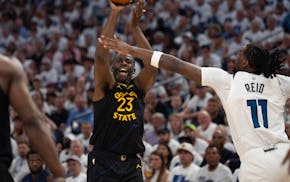
Wolves overtime: Key moments in Golden State's Game 1 victory
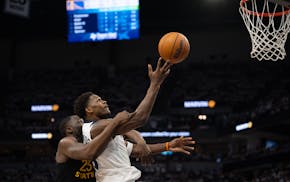
Barely there early and booed eventually, Timberwolves fall to Warriors in series opener
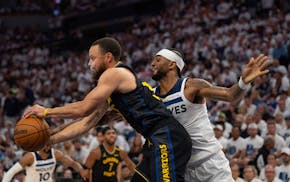
Warriors lose guard Stephen Curry in Game 1 against Wolves

Twins open homestand hot, defeat Orioles with heavy hitting from Correa, Buxton
